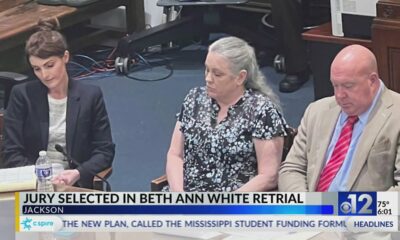Mississippi Today
Speaker White on Medicaid expansion negotiations: ‘Come for the savings, stay for the compassion’
As negotiations between the House and Senate begin on a final Medicaid expansion plan, Mississippi Today sat down with Republican House Speaker Jason White to discuss his position on what type of deal he's willing to reach with the Senate.
The House last week invited “conference” to hammer out a compromise on Medicaid expansion legislation. White will soon appoint three House members, and Republican Lt. Gov. Delbert Hosemann will appoint three senators to negotiate a plan.
As the House and Senate conferees start deliberating, White told Mississippi Today:
- The House would likely not agree to any plan that doesn't take advantage of about $1 billion a year in federal dollars to expand Medicaid coverage — as opposed to state taxpayers covering the cost as the Senate has proposed.
- The House is open to plans similar to Arkansas that would expand eligibility to 99% of the federal poverty level through traditional expansion and provide extra subsidies from the state's federal Medicaid money available from the Affordable Care Act to cover people between 100% to 138% of the FPL on the federal insurance exchange.
- He believes the House has the necessary two-thirds votes needed to override a potential veto from Gov. Tate Reeves.
- He wants the conference committee meetings to be open to the public.
Below is Mississippi Today's April 5 interview with White, edited for brevity and clarity.
Mississippi Today: Can we get the lay of the land from the House perspective on Medicaid expansion? Senate leaders appeared to draw their lines in the sand last week.
House Speaker Jason White: You say drawing lines. I would say that's their (the Senate's) first stab at a Medicaid expansion bill, or a reform bill, covering the working poor in Mississippi, however you want to term it.
I was encouraged last week by this. I've been here for 12 years. This is my 13th session. And for those 12 years, the Affordable Care Act was in place or coming into place as I was elected to the Legislature. We went from a place at that time, controlled by Republican majorities, now by supermajority, where, not only was there not a bill, there were no debates, no hearings, much less floor votes, other than an occasional amendment lobbed somewhere out there. We went from that place over a 12-year period to a place where in this session alone, we were able to do more than just get traction or have a hearing or get a bill up.
We had bills pass with two-thirds majorities in both chambers. Now, yes, their bill doesn't cover nearly as many people as I want to cover. It doesn't do the things that I think we need to do. But I think it is a great place to start. And at least it shows that two-thirds of that chamber and a majority of their Republicans in the Senate recognize that there is a health insurance coverage gap and that there's nothing coming for them. There's not some other product coming. They don't make enough money to afford private insurance, and there is no product they could buy that's out there. And yes, there is something on the exchange, but that is not a very good product – high deductibles, co-pays.
So, we were looking, we want something, we want to take advantage of the 90%-10% (federal match). We want to take advantage of that. My Republicans think that is the smart, common sense, business-minded thing to do. I'll admit this. Most of my Republicans don't get there because of compassion. They get there when they look at dollars and cents.
We see an unhealthy population that's uncovered.
And we see this as the best way. And you know, 40 states have passed expansion in some form. I think 19 of those states voted for Trump. So, it's not like this is some la-la land.
My people got there. It was a business decision when they look at our hospitals, our providers, our delivery of health care, specifically our delivery of rural health care in our state. And it's in a lot of ways, it's the only thing that makes dollars and cents. Now, if you come for the savings and stay for the compassion, I think that's all the more better, you know, to give these people a chance at some decent health care, some regular preventive health care that might prevent some of the problems that we end up – guess what – paying for anyway. And that's state taxpayers. We're sending our dollars to the federal government. And it's going to 40 other states to fund an expansion population of low-income workers. I just think it's time for us to realize that there's not something else coming down the pipe.
I would remind everybody, and I've done this everywhere I've spoken, even when I spoke to the Republican women. Donald Trump's been in the White House for four years. He had a (Republican) House and Senate for two of those four years. And guess what? The Affordable Care Act was not repealed. And it's still with us, and now with 40 states.
Y'all know this – they can't even pass an Easter resolution in Congress. They're not fixing to repeal the Affordable Care Act. Is it how I would have set it up? Probably not. But it's here and it's with us. And we're going to be asking, and I can assure you they're not going to change it for the poorest, most unhealthy state when all these other states have enacted it.
But those are the things that got my Republicans to a place as they hear from their hospitals, as they hear from their doctors in their districts as they hear from business owners who have lots of workers in this space, employees in this space. They want something done about it.
And so that's what drove it finally, and I think, I the House's strong position on it moved the needle and caused a real conversation. I think it made the Senate have to sit up and take notice. But again, while their bill doesn't go as far into the place I wanted to go to specifically, it is a start.
And I look forward to hopefully over the next 10 days to two weeks, seeing if we could find some compromise that's meaningful. I don't want to pass a bill just to pass a bill that actually costs taxpayers more money and covers less people.
MT: Do you foresee the House standing strong on covering people up to 138% of the poverty level, thus the state receiving the 90% federal money and the nearly $700 million so-to-speak signing bonus?
White: Well, I think it's not smart if you don't. You want to avail yourself to the enhanced reimbursement for the first two years that's been estimated at about $680 million. And here's something that has been lost in all of this conversation: Our plan was a four-year plan with a repealer.
And we know it's free to the state for those four years. No matter what anybody says, it's free for those four years. And it repeals at the end of four years. And everybody says, ‘Oh, if you start it, you can't stop it.' It stops without a further vote of the House and the Senate and a governor being willing to sign it or it be veto proof.
So my point is, it has to go through a whole other hurdle in four years where y'all are going to have a notebook full of data on what has happened in those four years. How much money did get spent? How many people did it cover? Did these people work 40 hours a week, 20 hours a week? Did they work two jobs, three jobs, no jobs?
You're gonna have that set of data because even if our work requirement is not approved in our bill, the managed care organizations that are going to be in charge of this population have to collect that data. We are putting that on them. Even if we don't have a true work requirement approved, you're going to collect that information while this free period is going on.
And if it's wildly expensive, if it's the woodwork effect that everybody says, and if there are 250,000 or 300,000 people on there and we can't afford it, then we would have hard decisions to make. Some folks would be really mad at me when I say we can't afford it, and we'll have to change the way we deliver it.
But again, lots of things can happen. There's a presidential election coming up. I don't know what that compromise looks like for this session. You know, Rep. Trey Lamar does have a bill that sets up a state exchange and brings about some tax credits for employers to cover their low-income workers and get a dollar-for-dollar basically a tax rebate or tax credit I should say.
We're going to push that hard. But again, at some point, you've got to look at the cost to deliver this health care. And, you know, I didn't hear anybody, I didn't see anybody writing any big negative articles when we chose to take (Gov. Tate Reeves' plan for) an enhanced Medicaid reimbursement model for our hospitals last fall. And that money is coming out of the same bank account that this money comes out of, whether anybody wants to admit it or not.
And so, you know, I don't, I've never been hung up on the names and the terminology. Certainly, we were all hung up on that for the last 12 years, and that was part of it. But we're to a place now where it's here with us. I just think it's got to make dollars and cents for us as we see the rising cost of health care in general.
If we weren't expanding, our Medicaid budget is increasing. We have to acknowledge that. So the last thing I want to do is create something that we can't pay for. I just think, especially through the first four years and almost $700 million you get right off the bat, it covers any potential runaway costs. Our bill also has a safeguard that if, for some reason, some big bad person changed the 90% to 10% match, this program ceases immediately.
So, I just think we have enough safeguards in there that we've got a true pilot program.
And I'm interested in the discussions that our House conferees can have with Senate conferees on those issues. The lieutenant governor has been big on, you know, public conference committee meetings, if you will. I look forward to conference committee meetings where we can talk about that.
MT: Do you think these conference committee meetings will be open to the public to see?
White: I think the public on this issue is probably going to demand it to some degree, is going to want to see where people are on it. Now I know y'all and lots of people are big on public conference committee meetings. But I also know that the reality is guys and girls talk on the phone and meet each other in the elevator and say, ‘I'm gonna send you that bill, and I made this one change.' You know how a lot of that conference work goes, so I'm not saying I want every conference committee to be like that. I think this one rises to a level where people are going to want to see where folks are on the issue. I understand where (Senate Medicaid Chairman) Kevin (Blackwell) is. He came from a place where — he's like me — he has not been for expansion. He was still saying that as recently as three to six months ago. And he's come from that place to a place of he's willing to consider this. He's well respected in that chamber down there. So probably our first goal is to see if there is any area of compromise or where we can convince him that our plan makes good dollars and cents from that standpoint.
MT: The Senate plan only covers people up to 99% of the federal poverty level. It seems like a natural compromise could be to go up to 99%, but have extra subsidies for people from 100% to 138% on the exchange, and still get the 90% federal money and use that for extra subsidies … or something similar to the Arkansa expansion program.
White: That's right. And we have a vehicle that's laying out there. We have (Rep.) Trey Lamar's state exchange bill that you could use to help work that into. That's something we certainly would want to explore.
MT: You would be open to something like that?
White: Yes. Look, at this point, if it makes sense, and when I say conservative, I mean from a dollars and cents standpoint. I'm convinced, and health care professionals have convinced me, that this population, this is the way to cover these individuals. Nothing else really makes sense. They don't pay high co-pays. They don't pay high deductibles if they have some of these plans that have seemed unworkable.
So as we get into these next two weeks, Trey Lamar's going to really look hard at that exchange, the product that's on the exchange, what's available, what does that state exchange exactly look like and and what of that ACA money could be used for that 100 to 138% that we could get the 90 to 10% on the whole thing, even if we only cover the others on traditional Medicaid up to 99%. The work requirement obviously is still laying out there.
MT: That work requirement appears to be a poison pill until there's a change in Washington.
White: It does, but here's something I've said to folks. Number one, we don't know because we hadn't been up there (in Washington) and actually met. Yes, we know what other states have done. We also see a president, you know, fighting for his life in an election coming this fall. We're one of the unhealthiest states, one of the poorest states.
It would be a cheap pilot project for the federal government to run on us by saying, ‘You know what? We're gonna take them at their word. We're going give them the work requirements. We're going to see what these people are doing. These are people that are hurting and need some relief, and this is a way to get it to them.'
And I'll say this, we've proved we'll be stubborn for 10 or 12 years on this issue, so they might be willing to take us up on this. And (Division of Medicaid Director) Drew Snyder over there running Medicaid, he's a smart guy. And he understands the ins and outs of Medicaid. I think if he really wanted to, he could make a convincing argument to the (Centers for Medicare and Medicaid Services) about this waiver.
While I didn't agree with everything that day that was said on the Senate floor when they debated their bill, I did think that Sen. Brice Wiggins made a good point about there are waivers all through our Medicaid program. Now, true enough, they're not Biden administration waivers that deal with work requirements, but there are waivers. Georgia's did survive a court battle, at least kind of sort of.
So I'm saying there is some hope. Some would perceive it as a poison pill. Even my detractors who didn't want us to find Medicaid reform and find coverage for these people through the Affordable Care Act, even claim that, you know, we're whistling through the graveyard by having a work requirement because it's just, you're just, you're being dumb.
But I do hold out some hope that if that is our only avenue for now, that we would send our director to meetings with CMS to try to achieve it. And again, we're in the middle of an election. And who even knows what happens with the election. And some have said, ‘Well, if Trump gets elected, then he'll approve the work requirement.'
Maybe he will, maybe he won't. I see him tweeting that he wants to repeal the Affordable Care Act. The only thing I would say about that is I just don't think our elected Congress and Senate is going to do that in Washington. And they didn't do it before when he was president.
MT: One other player in this is the governor. He's made it pretty clear how he feels. We've heard from Senate leadership that he's been lobbying hard. Is he doing the same over here?
White: To my knowledge, he's not. But, I mean, I don't know that he has to call House members over to the Mansion. You know, he's tweeting and his social media is active. He's made it very clear.
He makes it very clear in those speeches he gives these days. His stance has not changed. But I'll say the same thing to y'all that I've said to him. I think a person can vote for Tate Reeves for governor, be a supporter of those 400,000 or so people that voted for him. Some people voted for him in spite of his position on Medicaid expansion.
They voted for him because they wanted a Republican governor, a conservative governor running this state. And the reason I know that is because you're looking at one of them. I voted for him. But I'm very much for finding some sort of way to cover these people through Medicaid. So I'm optimistic, and certainly the strong vote in the House is intact through any potential veto. I think he probably knows that. He's obviously a much better politician than me. He probably understands that, you know, there's probably some room to play in the Senate. You know, with that thing being so close with 36 votes.
MT: We heard there were some issues perhaps with the Senate really not communicating with y'all early on. Was that the case?
White: I think that idea runs around here a lot through the years. Maybe it's just a difference in the Senate and the House. Now, it has been hard to figure out their direction on Medicaid. You know, I believe y'all were somewhere and the lieutenant governor was speaking and boy, he's fixing to take the lead on health care and some form of Medicaid expansion to cover the working poor. And, you know, it was like it was the bill we never could see, you know, for all those days and weeks. And while we welcomed a willing partner in this space, we never got one for a long time.
And so, you know, that probably did allow the governor to gain some traction and that sort of thing. But, hey, let me be clear: He stated his position to me privately from the get-go. The governor did. So I knew where he stood. I can appreciate that. And however many statewide elections he's won, it's that many more than me. But at the same time, I've got a duty to carry the banner of what my House members want to do, specifically my House Republican colleagues. And I got more than a two-thirds out of my House Republican colleagues on the issue. And, you know, around here, that's considered a major position.
And they didn't take their vote lightly. And so I've got a duty to hold that. Those people put me in here just like he claims his voters put him there.
MT: And you think the House will stand pretty strong on not leaving the federal money on the table?
White: I think we're being foolish if we don't. And if somebody wants to just pass something to check a box on this and say, ‘Well, we did something.' And, you know, sometimes it looks like that's what some people want to do is just be able to, you know, if I say it long enough, then I did it.
Well, you can say it all you want to. If you do something that costs more money and covers a fraction of the people that it would cover, have you really done anything?
MT: You don't think you would follow down that path?
White: I don't know that we would necessarily go down that road. But again, if you could cobble something together that goes up to 99% (on traditional Medicaid) and then get up above that on the exchange and make it more robust and get the 90 to 10 feature to it, that's something certainly we would explore. And I hope we can see some consensus around that in the coming days.
And look, there's people down there (in the Senate) just as smart as my people on this end of the building. It seems like there's been an inability to act down there.
You know, my folks were upset when they didn't move on PERS. My folks were upset when we never got a Medicaid bill. My folks are upset that we can't have dialogue on this education funding formula rewrite. And it gets that way this time of year. You know, somebody's looking for a fight, so to speak. There's no hostages down here to shoot. They haven't sent us anything big.
I think other than the budget, you're going to see some Medicaid back-and-forth and some education back-and-forth. But hey, those are our two major issues this session. Somebody framed it as this was halftime and here's what the scoreboard said and all that.
We're still in the game. It's late. I'm encouraged. I was down earlier this week, but I'm encouraged a little bit. I think we've got a chance on the education rewrite. I think we do have a real chance on Medicaid.
This article first appeared on Mississippi Today and is republished here under a Creative Commons license.
Mississippi Today
Law enforcement officers’ oversight bill heads to governor’s desk
The Mississippi Senate passed legislation Monday to give the state's officer certification board the power to investigate law enforcement misconduct.
House Bill 691, the revised version of which passed the House Saturday, is now headed to the desk of Gov. Tate Reeves.
The bill comes in the wake of an investigation by the Mississippi Center for Investigative Reporting at Mississippi Today and The New York Times into sheriffs and deputies across the state over allegations of sexual abuse, torture and corruption. The reporting also revealed how a “Goon Squad” of officers operated for two decades in Rankin County.
Public Safety Commissioner Sean Tindell said if the governor signs the bill, he anticipates the Mississippi Board on Law Enforcement Officer Standards and Training would hire a few investigators to investigate matters and make recommendations.
The bill would enable the board to establish a hearing panel on any law enforcement officer “for whom the board believes there is a basis for reprimand, suspension, cancellation of, or recalling the certification of a law enforcement officer. The hearing panel shall provide its written findings and recommendations to the board.”
In addition, deputies, sheriffs and state law enforcement would join police officers in the requirement to have 20 hours of training each year. Those who fail to get such training could lose their certifications.
Other changes would take place as well. Each year, the licensing board would have to report on its activities to the Legislature and the governor.
The bill calls for a 13-member board with the governor having six appointments – two police chiefs, two sheriffs, a district attorney and the head of the law enforcement training academy.
Other members include the attorney general, the public safety commissioner, the head of the Highway Patrol, and the presidents of the police chiefs association, the constable association, the Mississippi Campus Law Enforcement Association and the sheriff's association (or designee).
This article first appeared on Mississippi Today and is republished here under a Creative Commons license.
Mississippi Today
Legislators extend 2024 session after missing budget deadline
Legislative leaders are optimistic that they will be able to start passing bills to fund the $7-billion budget to fund state services on Tuesday.
“We will be rolling Tuesday and the day after I suppose,” said Senate Appropriations Chair Briggs Hopson, R-Vicksburg.
Late Monday the House and Senate agreed on a resolution to extend the session. Appropriations and revenue (taxes and borrowing) bills died Saturday night when House and Senate leaders could not reach agreement on a key deadline. The resolution approved Monday was needed to revive the bills.
The final day of the session was scheduled for Sunday, May 5. Now it is scheduled for May 14, but House Speaker Jason White, R-West, predicted Monday that the Legislature will finish its work this week, though leaders did concede there were still some “minor” disagreements between the House and Senate.
Under the resolution, the legislators – even though their work would be completed this week — will return on May 14 unless White and Lt. Gov. Delbert Hosemann agree not to return.
Returning on May 14 would give the Legislature the opportunity address any possible vetoes by Gov. Tate Reeves. Lawmakers can override gubernatorial vetoes with a two-thirds vote of each chamber.
Asked Monday if an agreement had been reached on the revenue bills, Senate Finance Chairman Josh Harkins, R-Brandon, who handles those proposals, said, “Gosh, I hope so. If not I am going holler a Jerry Clower for them to shoot up amongst us,” Harkins said referencing a skit by the Mississippi comic.
It took a two-thirds vote of both chambers to pass the resolution to extend the session. It passed unanimously in the House, but six members of the 52-member Senate voted no. Without the resolution, it most likely would require a special session called by Gov. Tate Reeves to pass budget bills and revenue bills.
This article first appeared on Mississippi Today and is republished here under a Creative Commons license.
Mississippi Today
Lawsuit in death of man following Jackson police encounter may be headed to trial
The family of George Robinson plans to move forward with a wrongful death lawsuit against the city of Jackson and three former police officers after rejecting a nearly $18,000 settlement offer.
Attorney Dennis Sweet III made the intentions of Bettersten Wade, Robinson's sister, and Vernice Robinson, Robinson's mother, clear in a Thursday letter sent the day after the City Council approved a $17,786 payment to settle the family's 2019 lawsuit.
“This is more than anyone should have to endure. Much less have the City of Jackson tout the purported term of settlement as some sort of victory,” Sweet wrote in the letter. “Needless to say, no individual or party obtained a victory in this matter.”
The financial terms of the settlement and plaintiffs' identities were not supposed to be disclosed publicly and the council did not approve the settlement in executive session, Sweet said. According to Mississippi's open meeting law, any public body can enter executive session for a number of reasons, including for negotiations relating to litigation.
Sweet was not immediately available to comment Monday. Last week, he told WLBT he would take it to trial.
Council President Aaron Banks, who was also not immediately available for comment, said the settlement was freely negotiated among the parties and signed by Wade and Vernice Robinson, who had their attorneys with them, according to a Friday statement to the Clarion Ledger.
Banks disputed Sweet's claims that the city violated any terms of the settlement, such as a confidentiality agreement, saying the city didn't agree to one and that settlements are public records, according to the statement.
“The City intends to honor the agreement it reached and expects the Wade family to do so, also,” Banks said in the statement.
However, some city council members said after the meeting that they were not aware of a confidentiality agreement.
City Attorney Drew Martin declined to comment Monday.
All the parties met for mediation April 12. Sweet said that during the session, a representative from the city said it is in “financial straits and did not possess substantial funds in which to resolve Ms. Wade's claims against it.” The lawsuit complaint asked for a jury trial and damages to be determined by a jury.
Banks's statement did not address the attorney's claim about the city's finances.
Wade agreed during mediation to settle with ambulance provider American Medical Response and to allow the city to join that settlement and end litigation, according to Sweet's letter.
“Had AMR not agreed to a substantial settlement amount, Ms. Wade would not have settled with the City of Jackson,” he wrote in the letter.
The company settled for a different amount that was not disclosed, according to Sweet's letter.
As of Monday, electronic court filings for the lawsuit do not show that the judge has signed off on a settlement.
In January 2019, 62-year-old Robinson was pulled from a car and beaten by officers, leaving him with severe injuries. At the time, he was recovering from a stroke. Robinson died days later.
In 2022, former detective Anthony Fox was convicted culpable-negligence manslaughter for Robinson's death, while charges against officers Desmond Barney and Lincoln Lampley were dismissed a year earlier.
Fox was incarcerated until January when the Mississippi Supreme Court overturned his conviction and issued an acquittal, freeing him. Fox has returned to work for the Canton Police Department.
This isn't Wade's only loss and fraught experience with the city, Sweet said.
Last year, her son Dexter died after being hit by a car driven by an off-duty Jackson police officer. He was buried unidentified in the Hinds County pauper's field, despite having identification on him. His family did not know he was there until months later.
This article first appeared on Mississippi Today and is republished here under a Creative Commons license.
-
Local News5 days ago
Sister of Mississippi man who died after police pulled him from car rejects lawsuit settlement
-
Mississippi Today5 days ago
At Lake High School in Scott County, the Un-Team will never be forgotten
-
Mississippi Today2 days ago
On this day in 1951
-
Mississippi News3 days ago
One injured in Mississippi officer-involved shooting after chase
-
Mississippi News6 days ago
Viewers make allegations against Hatley teacher, school district releases statement – Home – WCBI TV
-
Mississippi News Video5 days ago
Vehicle struck and killed man lying in the road, Alcorn County sheriff says
-
Mississippi News4 days ago
Ridgeland man sentenced for molesting girl
-
Mississippi News5 days ago
Suspected Dollar General armed robber arrested in Pickens County


































